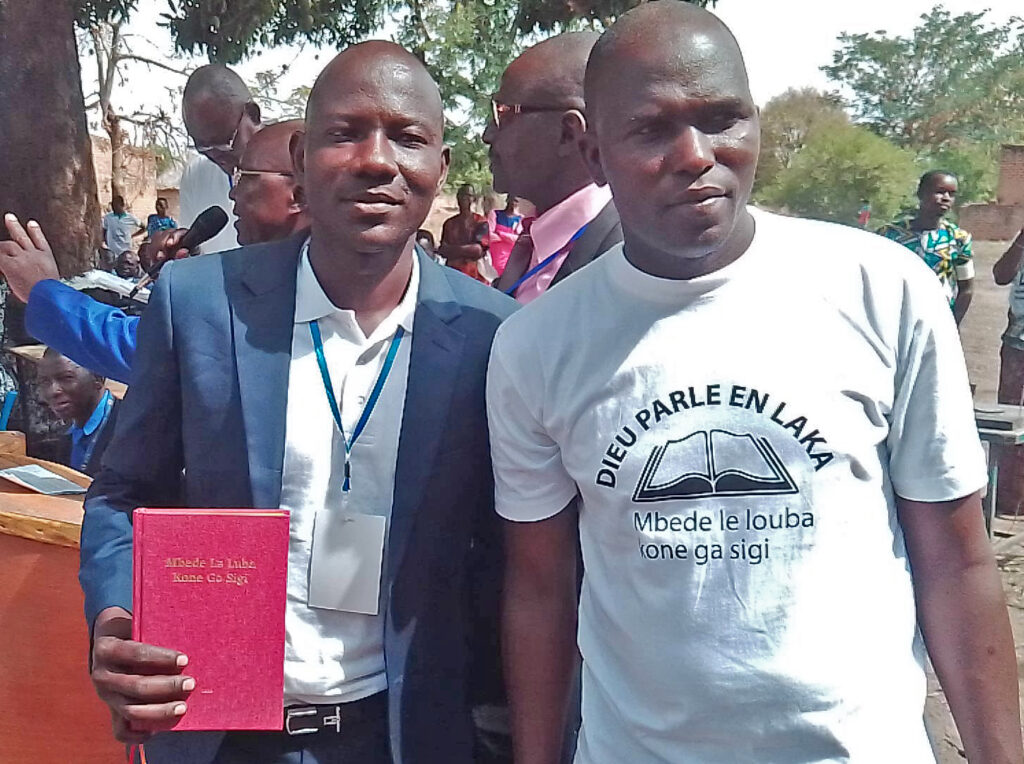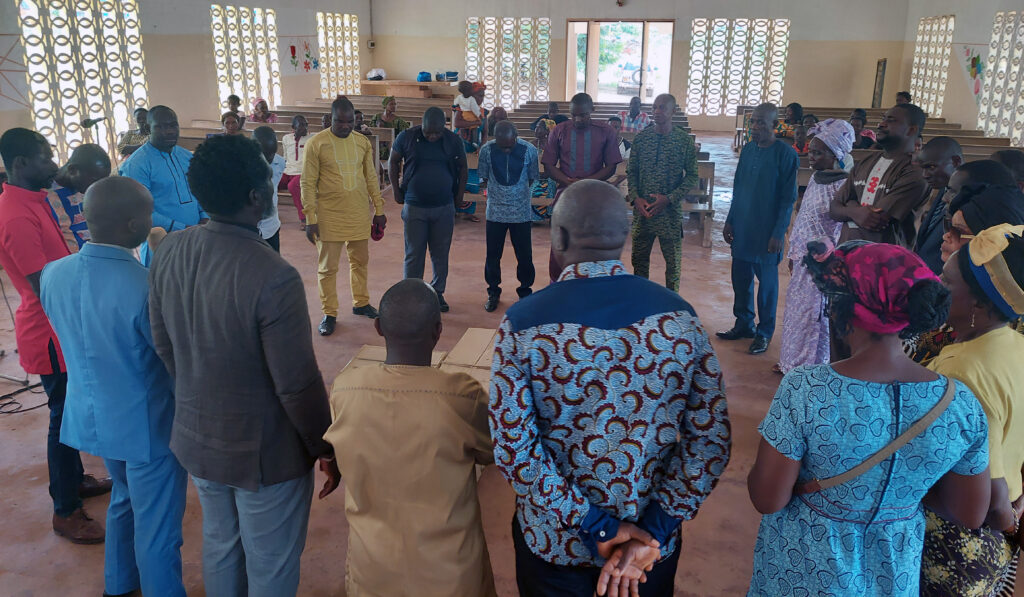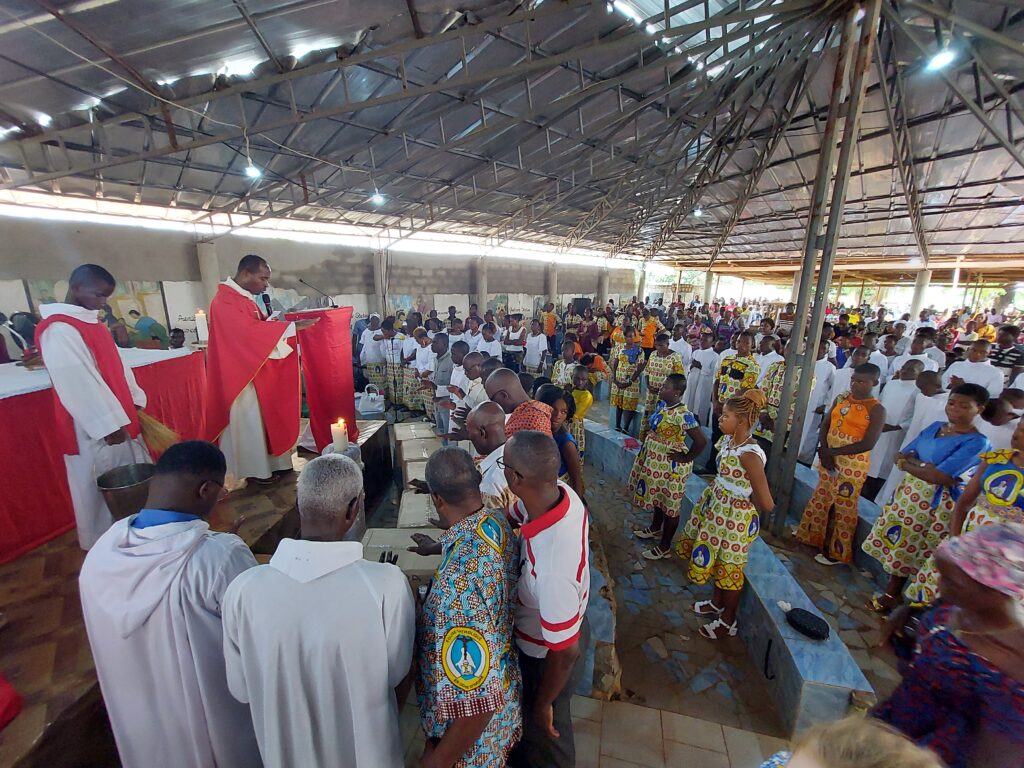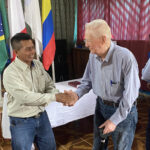The Danger of Water Travel in Papua New Guinea
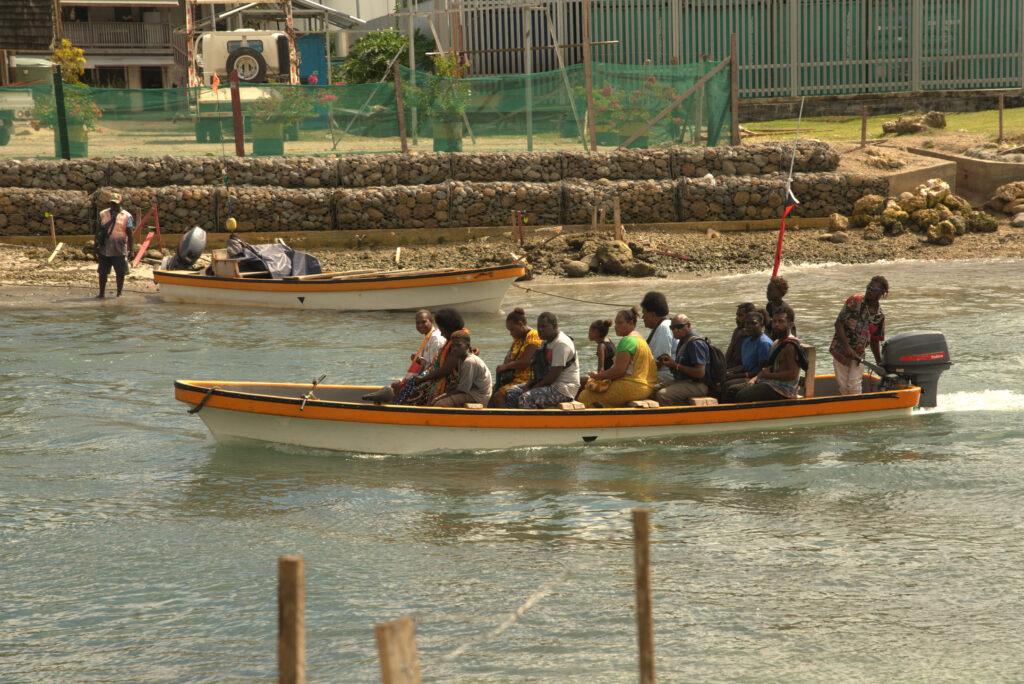
With the kind of bravery that the early missionaries faced as they traveled into the unknown to share the gospel, or that Bilbo, the hobbit from the book, The Hobbit, displayed as he left his home to travel into unknown parts of Middle Earth, our co-laborers in Papua New Guinea (PNG) constantly put themselves in danger to share God’s love with their communities.
On this island nation, these heroes must travel across open ocean in dinghies that are meant for calm, flat water. Sometimes 10-foot waves can tower over them with steep drop-offs on both sides. One wrong flip or turn, and they could end up with a swamped boat, adrift at sea. “Will I survive this?” is often their thought as the waves toss their tiny boats every which way, spraying saltwater into their eyes and damaging their cargo. Unlike the fictional Bilbo, these real-life heroes face real obstacles that could end in a very real death.
At any time, pirates could zoom up in their larger, more powerful boats and demand that these Christians hand over their equipment or even their boat. Fear of the unknown constantly preys on their minds. “Anything can happen anytime,” Amy Rose Paisawa, a translator, said. Sometimes the only boat available is one in which these heroes sit packed in with other passengers. It wouldn’t take a 10-foot wave to capsize such a large boat, and every dip of the boat matches the dips of fear in the passengers’ stomachs.
Other times, our co-laborers must hunt for fuel. One man had to walk for miles just to find fuel for the dinghy, exhaustion weighing down his every step even before he got on a boat. There are no gas stations on these remote islands!
“We don’t have life jackets, and we encounter waves and so many discomforts,” one translator said. “Even the dinghies don’t have life jackets. One of the most important things we need is a compass because when we get on the dinghy, oftentimes when our operators try to refuel, the dinghy [drifts], and [the dinghy operator] loses their course and we end up traveling in the wrong direction.”
Although Bilbo put himself at risk to help the dwarves that eventually became his friends, there is no real danger to a fictional character’s life. However, these real-life heroes must frequently encounter such life-threatening risks because water travel is the only way to reach people with the gospel. “You can’t wait for the less-loaded boat,” explained Tim McIntosh, director of JAARS Sea Operations. “If there is another option, it’s usually just as overloaded. There are inherent risks when traveling by water, and those risks are understood, but the option is to travel or not.”
Water Safety Training: Skills to Take Them the Last Mile
Recognizing these challenges, the JAARS Sea Ops team traveled to three different regions of PNG—Alotau, Bougainville, and Madang—to provide water safety training for Bible translators with the Papua New Guinea Bible Translation Association (BTA).
For trainers, a learner attitude is critical to understanding the needs of students. Just as Bilbo and the dwarves had to listen carefully to Gandalf’s explanations and cautions before venturing into the unknown, the JAARS water safety team traveled to PNG with a learner attitude: “We prefaced our training with the words, ‘We want to learn from you. Tell us your challenges,’” Tim said. “’Maybe some of these resources and skills will improve your outlook in terms of safety on the water.’” The JAARS Sea Ops team listened to the Bible translators’ needs in order to meet the specific challenges the translators encountered on the sea.
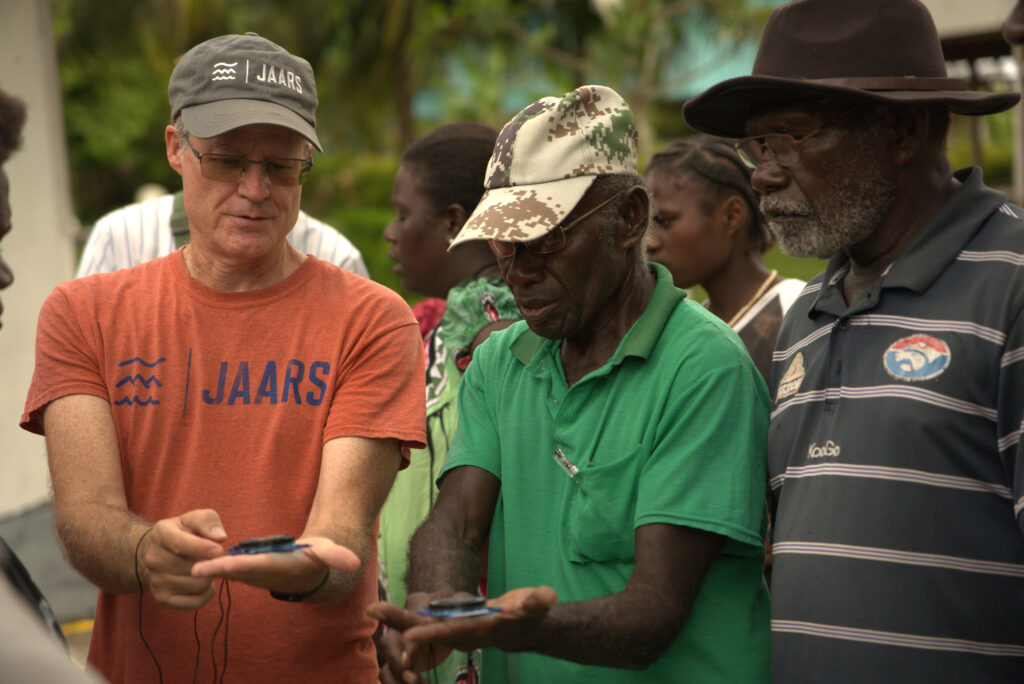
On the journey to the training sites, the JAARS Sea Ops team also experienced the kind of travel challenges that our co-laborers in Papua New Guinea face daily. A JAARS-trained pilot flew the team to the SIL center in Ukarumpa. Then the team took a bus and four-wheel-drive vehicles down to Lae, a town three to four hours away. After driving back to Ukarumpa, the team drove to Madang on a long and bumpy road. “We were thankful for the Land Cruiser that JAARS had helped BTA acquire earlier [in 2023], and [for how Land Ops] trained them how to drive off-road,” said Caleb Pepper, the former Sea Operations Fellow.
During a two-day training in Madang, the participants practiced capsizing a boat in the shallows.
Alphonse, one of the participants, had hiked for hours to several villages to find fuel just to reach the training. “At first, I was afraid, but when I attended the course, I was thankful. I’m going to bring some new ideas to our village people to teach them how to swim and to teach them more of what I have learned in this training.”
The Sea Ops’ team’s guidance for these co-laborers on the islands of PNG can be shared among many people, exponentially increasing the safety of many people.
Gandalf began preparing Bilbo for his encounter with the dragon Smaug long before the hobbit entered the Lonely Mountain. So, too, the JAARS water safety team began its preparations months before the men stepped onto an airplane for the long journey to PNG. They shipped a large container full of life jackets and a dozen water safety kits, which are floating bags that contain a variety of equipment. Thankfully, all of this gear arrived in time!
The Sea Ops team also carried a dozen more life jackets and other safety equipment as they traveled for 28 hours on flights to their initial destination in Papua New Guinea.
The Guide They Need
From Madang, the Sea Ops team flew to Port Moresby, the capital. They then took a domestic plane to Buka Island, then traveled on a dinghy for about 45 minutes—the way our co-laborers travel all the time—to the small island of Matsungan, home of one of the three translation teams that received training. “The water was dark and not very nice to us,” Caleb explained. “We were getting jostled around a lot. Thankfully, the national translator next to me had a big tarp that he brought, so we covered the whole front of ourselves with it. I’m glad he had that because it was soaked by the time we got all the way to the island.”
Matsungan Island is only a few miles away from the island where the Petats language team lived. The third team came from Saposa Island about one hour away. The Sea Ops team used a lagoon alongside the island to conduct the in-water training.
The teams were thankful for the opportunity to practice wearing and floating with the lifejackets. One man had doubted the usefulness of life jackets, but after taking the training, he realizes how important they are. A woman said, “This was my first time wearing a life jacket. It’s helped me to understand how to use a life jacket, how to use a compass, how to help educate others.”
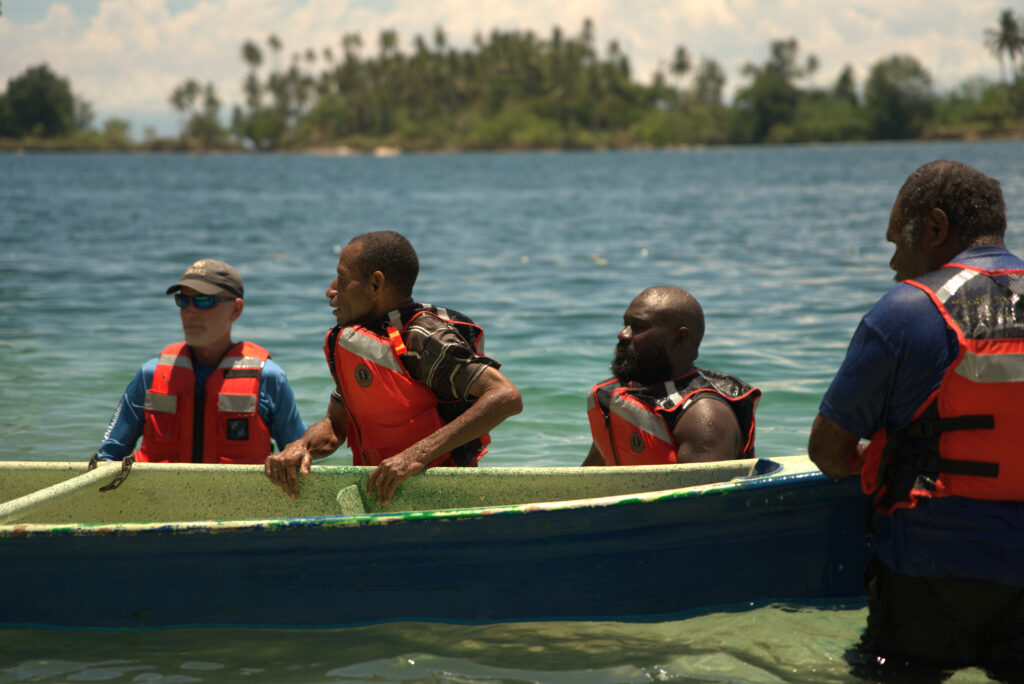
The training by the Sea Ops team was unfamiliar to the BTA participants at first. However, by its end, the BTA participants believed that the valuable guidance of the Sea Ops team could save lives.
Toward the end of The Hobbit, we see fiction representing life. The dwarves didn’t understand why Gandalf brought this bumbling, home-loving creature along on their dangerous quest. But once they saw evidence of how Bilbo could be useful to them, they began to believe that Bilbo could be a powerful tool to help them defeat the dragon Smaug and reclaim their treasure. Tools such as lifejackets can keep co-laborers in Papua New Guinea safe and defeat the danger found in the cold, dark, and unfriendly waters of the Coral Sea and the South Pacific Ocean. But first, the BTA participants needed to trust the guidance of the Sea Ops team.
The co-laborers were thankful that the Sea Operations team took the time to travel so far to give them tools that will help them get where they need to go safely. “When JAARS came here to run this training,” recalled Orim Joel, a BTA leader, “[the teams] were really encouraged, and I was, too, to know that there are people praying and supporting [them]. They have confidence in traveling on the seas.” Trust. Confidence. Safety.
Just as Gandalf equipped Bilbo and the dwarves for the long, arduous path before them in their fight to reclaim their homeland, the Sea Ops team has now equipped these co-laborers with the training and tools necessary to stay safe on their arduous, watery journey to bring the light of the gospel to their communities. If Bilbo and the dwarves had lacked the skills and knowledge to reach the Lonely Mountain, they could have died.
Even more so, the lives of these real-life heroes would be at greater risk had the Sea Ops team not given them the knowledge, skills, and tools to survive life-threatening obstacles.
Thanks to your continued support, we may have saved lives—the lives of those sharing the gospel with more people, and of those saved by being brought into the kingdom of God.
Your gifts to Sea Operations could save lives! Give here.




























































